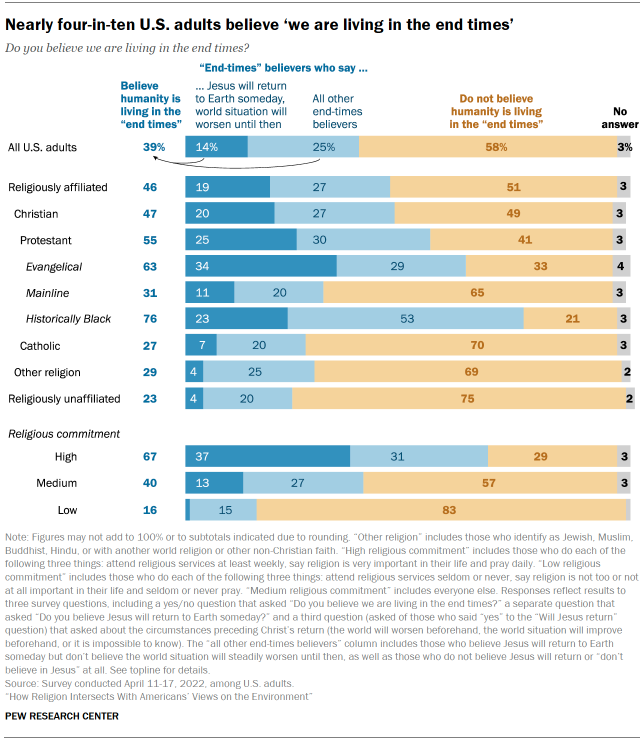
Are the Biblical End Times Upon Us?
Famines, earthquakes, wars, and rumors of wars are just some of the signs Jesus attributed to the “beginning of birth pains” (Matthew 24) set to precede the end of days.
Listen to the latest episode of CBN’s Quick Start podcast
But are the end times now upon us? Scripture makes it clear no human being knows the eschatological timetable, though many have pondered and discussed it over the years.
And considering the dire state of affairs in the U.S. and around the globe, contemporary speculation is commonplace. So, what does the data show?
The Pew Research Center recently unveiled data showing 58% of Americans said “No” when asked, “Do you believe we are living in the end times?”
But while a majority rejected such a notion, nearly four-in-10 Americans (39%) do believe humanity is living in the end of days. That number is unsurprisingly higher among Christians, with 47% of believers answering affirmatively.
Pew also specifically measured the view that Jesus will eventually return and that the Earth will worsen before that time, finding 14% of Americans believe this will be the case. The rest of the 39% of those who believe we’re in the end days “do not express this premillennialist perspective.”
Of the 47% of Christians who believe humanity is living in the end times, 20% said Jesus will return to earth and the “world situation will worsen until then,” with an additional 27% stating they believe in the end of days but not in that particular dynamic.
The higher Americans’ religious commitment, the more likely they are to believe the world is in the end of days. In fact, 67% of those with a high religious commitment believe this is the case, compared to just 16% of those with a low religious commitment.
The most likely religious cohorts to believe the world is in the end of days are historically black Christians (76%), evangelicals (63%), and Protestants (55%) more broadly (both of the aforementioned groups fall under the Protestant banner).
The least likely religious groups to say the same are the religious unaffiliated (23%) and Catholics (27%).
Lifeway expanded upon these belief systems to explain the main frameworks embraced by most Christians today. These include: premillennialism, amillennialism, and postmillennialism.
A 2016 study based on my book “The Armageddon Code: One Journalist’s Quest for End-Times Answers” found where pastors fall on these perspectives. Nearly half (48%) are premillennial, while 31% are amillennial, and 11% are postmillennial — but what does this mean?
“Postmillennialism asserts the world will gradually improve and the 1,000 years happens before Jesus’ physical return,” Lifeway explained. “Amillennialism believes the reign is figurative and is already happening as Christ rules in the hearts of believers.”
The survey organization continued, “Premillennialism says the return of Christ will usher in the 1,000-year reign and is often connected with circumstances in the world worsening until His second coming.”
***As the number of voices facing big-tech censorship continues to grow, please sign up for Faithwire’s daily newsletter and download the CBN News app to stay up-to-date with the latest news from a distinctly Christian perspective.***




